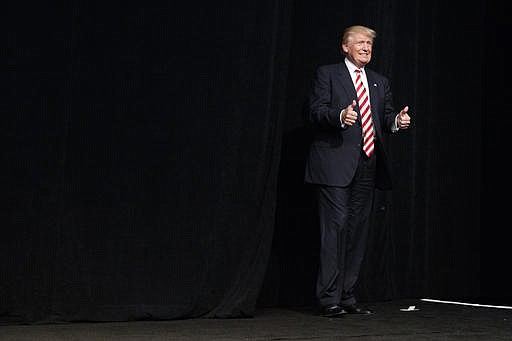DES MOINES, Iowa (AP) - Donald Trump is rolling out plans to make child care more affordable, guaranteeing new mothers six weeks of paid maternity leave and suggesting new incentives for employees to provide their workers childcare, breaking with conservative orthodoxy and wading into topics more often discussed by Democrats.
Trump will unveil the plans in a speech in a politically critical Philadelphia suburb as he tries to build his appeal with more moderate, independent voters - especially women. Child care is one of the biggest expenses many American families face, surpassing the cost of college and even housing in many states.
Trump had said little about child care until his daughter, Ivanka, surprised many at the Republican National Convention in July by promising to make it a centerpiece of a Trump administration. During a rally in Des Moines Tuesday afternoon, Trump credited Ivanka Trump for his action on the issue. "She is the one who has been pushing for it so hard: 'Daddy, Daddy we have to do this.' She's very smart, and she's right," the candidate said.
Trump is expected to propose guaranteeing six weeks of paid maternity leave to employees whose employers don't offer leave already. The campaign says the payments would be provided through existing unemployment insurance - though it has yet to spell out how the system would cover those costs.
Trump's Democratic opponent, Hillary Clinton, has called for 12 weeks parental leave for both mothers and fathers paid for by taxes on the wealthy.
Trump in August proposed reducing child care costs by allowing parents to fully deduct the average cost of child care from their taxes. He is expected to flesh out that plan Tuesday, including expanding the deduction to include costs associated with caring for elderly dependent relatives.
The deduction would apply only to individuals earning $250,000 or less, or $500,000 or less if filing jointly. However, because Trump's proposal is a tax deduction rather than credit, its greatest benefits would go to affluent households. More than 40 percent of U.S. taxpayers don't make enough money to owe taxes to the federal government, meaning they would not benefit from a deduction. Lower-income earners would receive child-care spending rebates through the existing Earned Income Tax Credit, the campaign said.
Trump is also expected to propose incentives for employers to provide child-care options at work. However, his proposals to prod businesses and communities into providing childcare and other services are anathema to conservative orthodoxy.
Trump will also lay out plans to create "Dependent Care Savings Accounts" that would allow families to set aside money to look after children or elderly parents. The accounts would allow tax-deductible contributions and tax-free appreciation and could be used to pay for child care, after-school programs and school tuition. To help lower-income parents, the government would match half of the first $1,000 deposited per year.
For elderly dependents, the accounts could be used to help pay for services including in-home nursing and long-term care.

